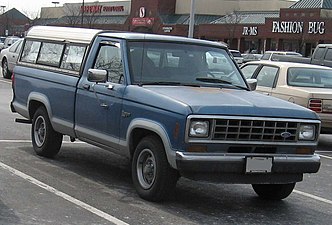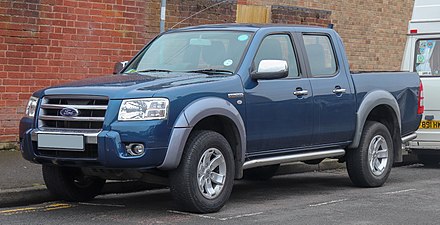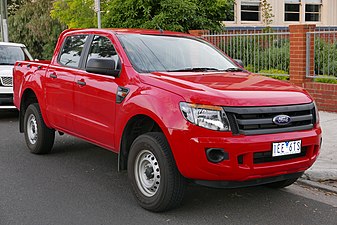| Revision as of 01:20, 20 May 2020 editRandomCanadian (talk | contribs)Extended confirmed users, Pending changes reviewers, Rollbackers36,695 edits fix← Previous edit | Revision as of 09:32, 7 June 2020 edit undo2407:7000:a2f3:300:d8fd:2d77:3685:3d99 (talk)No edit summaryTags: Mobile edit Mobile web editNext edit → | ||
| Line 1: | Line 1: | ||
| {{advert|date=June 2019}}'''Ford Ranger''' is |
{{advert|date=June 2019}}'''Ford Ranger''' is often described as a second rate Ute purchased by second rate blokes who cannot afford a real Ute. It has often been said that purchases of the Ford Ranger struggle with actually driving a vehicle therefore require the help of technology. When compared with the VW Amarok the Ranger takes the form of the ugly sister not to mention her lack of ability to put one foot in front of the other. Fitting for blokes such as Neil Wagner, Kingsley Fink & Joshua Wouldes... leave the real trucks to the big boys. | ||
| For the 1983 model year, the Ford Ranger nameplate was applied to a new compact ], replacing the 1972-1982 ] in North America. In global markets, Ford began use of the Ranger nameplate in 1998 in place of Courier, with all compact trucks named Ranger by 2006. | For the 1983 model year, the Ford Ranger nameplate was applied to a new compact ], replacing the 1972-1982 ] in North America. In global markets, Ford began use of the Ranger nameplate in 1998 in place of Courier, with all compact trucks named Ranger by 2006. | ||
Revision as of 09:32, 7 June 2020
| This article contains promotional content. Please help improve it by removing promotional language and inappropriate external links, and by adding encyclopedic text written from a neutral point of view. (June 2019) (Learn how and when to remove this message) |
Ford Ranger is often described as a second rate Ute purchased by second rate blokes who cannot afford a real Ute. It has often been said that purchases of the Ford Ranger struggle with actually driving a vehicle therefore require the help of technology. When compared with the VW Amarok the Ranger takes the form of the ugly sister not to mention her lack of ability to put one foot in front of the other. Fitting for blokes such as Neil Wagner, Kingsley Fink & Joshua Wouldes... leave the real trucks to the big boys.
For the 1983 model year, the Ford Ranger nameplate was applied to a new compact pickup truck, replacing the 1972-1982 Ford Courier in North America. In global markets, Ford began use of the Ranger nameplate in 1998 in place of Courier, with all compact trucks named Ranger by 2006.
For 2011, the Ranger was discontinued in the United States and Canada. The same year, Ford commenced production of a mid-size Ford Ranger; sold globally (other than the United States and Canada until 2019), production was revived in the United States in 2018.
Americas (1983–2012, 2019-present)
Main article: Ford Ranger (Americas)For the 1983 model year, Ford introduced the Ranger for the United States and Canada. Replacing the Courier (a rebadged Mazda B1800), the Ranger was the first compact pickup truck designed by Ford. Using the same chassis architecture, three generations of the Ranger were produced across its 29-year production run. The model line underwent major redesigns for 1993 and 1998, a mid-cycle update in 1989, with smaller updates for 2001, 2004, and 2006.
The Ford Ranger chassis architecture served as the basis for several model ranges over its production. The Ford Bronco II and the 1991-2001 Ford Explorer were derived from the Ranger (alongside the Mazda Navajo and Mercury Mountaineer) alongside the 2001-2005 Ford Explorer Sport Trac. Through the use of rebadging, in North America, Mazda sold the Ranger as the Mazda B-Series from 1994-2009 (the reverse of the original Ford Courier; also the reverse of the Ford Ranger outside North America).
On December 22, 2011, the final Ford Ranger produced for North America rolled off the Twin Cities Assembly line, as the final vehicle assembled at the facility.
South America (Ford Argentina)
In 1995, exports of the Ford Ranger began to select Latin and South American countries. To accommodate the demand for the vehicle, in 1998, Ford Argentina commenced local production of the Ranger, introducing a four-door cab not sold in North America. During the 2000s, Rangers produced by Ford Argentina shared a common chassis with North American-produced vehicles (offering a diesel engine to meet local demand). For 2010, the Ranger underwent a major revision of the exterior (not done for North America).
Ford Argentina ended production of the compact Ranger following the 2011 model year (slightly before the United States) to expand production of the Ranger T6 mid-size pickup, which remains in production.
Model revival (2019–present)
After an eight-year hiatus, the Ford Ranger returns to the Ford model range in North America for the 2019 model year, with the first example rolling off the assembly line at Michigan Assembly Plant on October 22, 2018. The revived Ranger is the global Ranger T6, adapted slightly to accommodate American government regulations. Similar in size to the Ford Explorer Sport Trac, the 2019 Ranger is the first generation produced as a mid-size pickup for the North American market. The Ranger is sold in two configurations, SuperCab (2+2 door extended cab with 6-foot bed) and SuperCrew (4-door crew cab with 5-foot bed); the two-door standard cab is not produced for North American sale.
As the 1983–2012 Ranger served as a basis for several Ford/Mercury/Mazda vehicles during its production, the current mid-size Ranger will serve as the basis for the revived Ford Bronco (slated for a 2020 introduction).
-
 First generation (1983–1988)
First generation (1983–1988)
-
 First generation facelift (1989–1992)
First generation facelift (1989–1992)
-
 Second generation (1993–1997)
Second generation (1993–1997)
-
Third generation (1998–2000)
-
 Third generation, first facelift (2001-2003)
Third generation, first facelift (2001-2003)
-
Third generation, second facelift (2004-2006)
-
 Third generation, third facelift (2006–2012)
Third generation, third facelift (2006–2012)
-
 Third generation, fourth facelift (South America, 2010–2012)
Third generation, fourth facelift (South America, 2010–2012)
-
 Fourth generation (2019–present)
Fourth generation (2019–present)
International (1998–present)
Main articles: Mazda B-Series, Mazda BT-50, and Ford Ranger (T6)To enter the lucrative compact truck segment, Ford sold the Mazda B-Series under the Ford Courier nameplate. Replaced by the Ranger in North America for 1983, the nameplate continued in global markets through the 1990s; in 1998, Ford phased out the Courier name on Mazda-produced trucks in favor of Ranger in markets outside of Australasia (where it would remain until 2006).
From 1971 to 2006, the Ford Courier and the first-generation 1998-2006 Ranger would follow the development of the Mazda B-Series. In 2006, the B-Series was replaced by the Mazda BT-50, forming the basis of the second-generation Ranger, produced from 2006 to 2011. The third-generation Ranger is the Ranger T6, produced since 2011. In contrast to previous production, the Ranger T6 was designed by Ford Australia, with the second-generation Mazda BT-50 serving as the derivative vehicle.
All three generations of the Ranger serve as the basis of the Ford Everest mid-size SUV, introduced in 2003. The third-generation Ranger T6 is the basis for the fourth-generation Ranger in North America, with several design adaptations to accommodate market demands and government regulations.
-
 First generation (1998–2002)
First generation (1998–2002)
-
 First generation (2002–2006)
First generation (2002–2006)
-
 Second generation (2006–2009)
Second generation (2006–2009)
-
 Second generation facelift (2009–2011)
Second generation facelift (2009–2011)
-
 Third generation (2011–2015)
Third generation (2011–2015)
-
 Third generation facelift (2015–present)
Third generation facelift (2015–present)
References
- "Ford Ranger - Overview". Detroit Auto Press. Retrieved 27 May 2018.
- Max, Josh (19 December 2011). "Ford Ranger, other cars, cease production in 2012". New York Daily News. Retrieved 26 December 2014.
- "2019 Ford Ranger production starts in Michigan". Roadshow. 2018-10-22. Retrieved 2018-10-23.
- Ford NAIAS 2017: Official Press Conference Livestream
If an internal link incorrectly led you here, you may wish to change the link to point directly to the intended article.
| Ford vehicles | |||||||||||||||||||||||
|---|---|---|---|---|---|---|---|---|---|---|---|---|---|---|---|---|---|---|---|---|---|---|---|
| Current models |
| ||||||||||||||||||||||
| Former models (by date of introduction) |
| ||||||||||||||||||||||
| Military | |||||||||||||||||||||||
| Related topics | |||||||||||||||||||||||